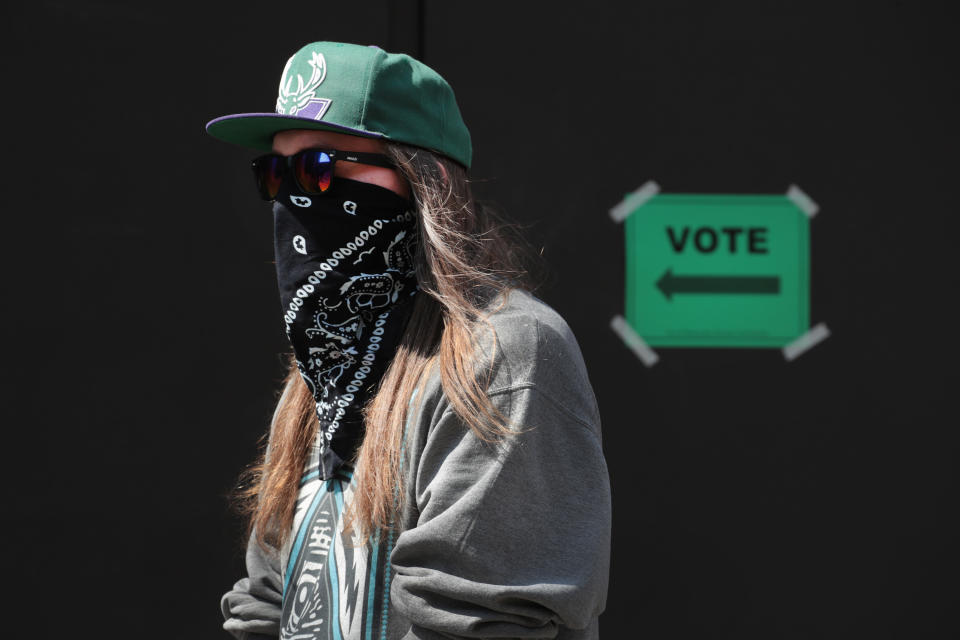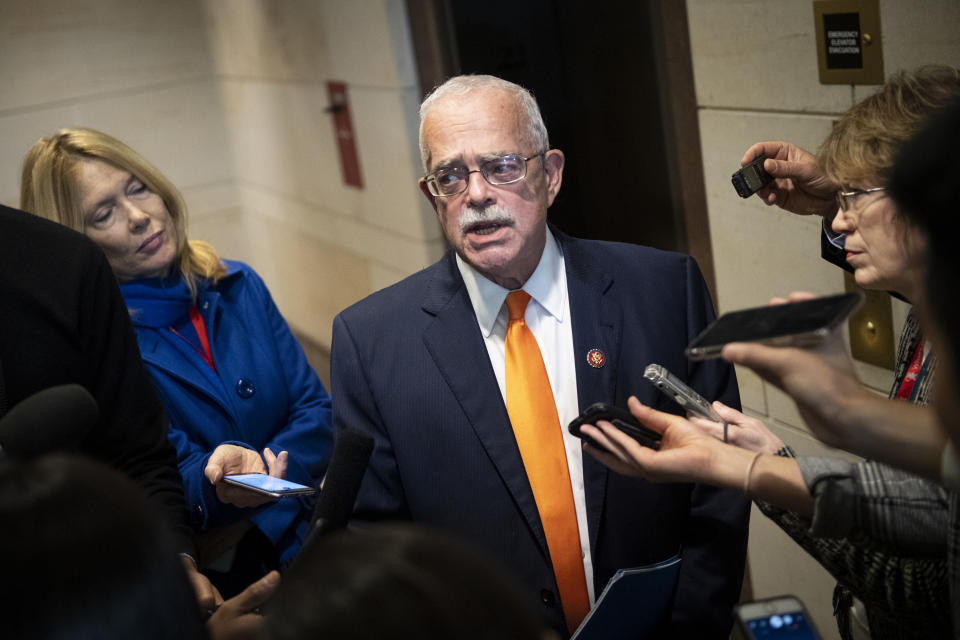Coronavirus-spurred fights over vote-by-mail and the Post Office are coming to Congress
In March, Democrats made a push to get money for vote-by-mail and to shore up the U.S. Postal Service into the $2.2 trillion coronavirus stimulus bill.
The final package included much less than they wanted: $10 billion in additional borrowing authority for the USPS and $400 million for election security funding.
This time around, Democrats have ramped up their efforts and it could be one of the most challenging issues ahead as policymakers try and hash out a phase 4 stimulus package in the coming weeks.
On one side of the issue are figures like Stacey Abrams who is being mentioned as a potential running mate for Joe Biden. “I believe the next CARES package has to include funding for our states to move to more vote by mail,” she said in a Yahoo Finance interview Wednesday. Making it a viable option by the fall “can only happen if our federal government invests in our states today,” she said.

On the other side of the issue, President Trump has stood against increasing voting-by-mail and belittled efforts to increase USPS funding. “This is a new one,” he said on April 7, adding sarcastically, “I'm now the demise of the Postal Service.”
As it currently stands, the Postal Service could run out of money before the November election. The $400 million for election security can be used for vote-by-mail – but it may also be spent on things like cleaning voting machines.
Republicans should fight very hard when it comes to state wide mail-in voting. Democrats are clamoring for it. Tremendous potential for voter fraud, and for whatever reason, doesn’t work out well for Republicans. @foxandfriends
— Donald J. Trump (@realDonaldTrump) April 8, 2020
Mail-in ballots are either ‘critical’ or ‘corrupt’
Five states currently conduct elections entirely by mail: Colorado, Hawaii, Oregon, Washington and Utah. Many others offer what is known as “no reason” absentee voting as an option. The left-leaning Brennan Center for Justice estimates that it will cost between $982 million and $1.4 billion to ensure every voter has a vote-by-mail option.
Abrams has been a key Democratic voice on the issue since her 2018 run for governor of Georgia ended with a narrow loss, in her view, marred by voter suppression.
She is focused on changing the system, saying “voting by mail is so critical because we need to make certain as many people as possible can access their ballot without putting their lives at risk”.
House Speaker Nancy Pelosi reportedly suggested $2 billion for additional voting systems in the upcoming legislation and there are a range of Democratic proposals floating around Capitol Hill.
Senators Amy Klobuchar (D-MN), Ron Wyden (D-OR), and Chris Coons (D-DE) have introduced a stand-alone bill to expand no-excuse absentee vote-by-mail to all states. Sen. Kamala Harris (D-CA) has been touting her “plan to save the election” and Sen. Kirsten Gillibrand (D-NY) called for no-excuse absentee voting in a letter to Senate leadership on Thursday.
The president, along with his fellow Republicans, have argued against additional funding. “The mailed ballots are corrupt, in my opinion,” Trump recently said.
Absentee Ballots are a great way to vote for the many senior citizens, military, and others who can’t get to the polls on Election Day. These ballots are very different from 100% Mail-In Voting, which is “RIPE for FRAUD,” and shouldn’t be allowed!
— Donald J. Trump (@realDonaldTrump) April 8, 2020
Senate Republicans also don’t seem enthusiastic to embrace vote-by-mail. Sen. Ted Cruz (R-TX), in an interview with Yahoo Finance, said, "I can tell you in Texas, the experience with absentee ballots is that absentee ballots are particularly ripe with opportunities for voter fraud."
Cruz pointed to so-called ballot harvesting. There have been reports of fraud from election assistants – called politiqueros in Texas – who allegedly falsified absentee ballots. The charges have been highlighted by a prominent Texas Republican commentator.
It is common practice around the country for political campaigns in both parties to have volunteers assist voters in filing absentee ballots, depending on what the laws allow.
Fact checkers have responded to the claims of widespread problems by noting “instances of voter fraud via mail-in or absentee ballots are more common than in-person voting fraud [but] the number of known cases is relatively rare.”
Abrams pushes back on the Republican claims of fraud, saying we should “acknowledge that voter fraud is almost nonexistent in this country.” She adds: “almost every example of voter fraud is by and large attributable either to confusion or to mistakes.”
Trump has also made clear he’s concerned about what any changes in the system would mean for Republican electoral prospects.
“The things they had in there were crazy,” Trump said in a Fox News interview discussing Democratic initiatives stripped out of the phase 3 deal. “They had things — levels of voting that, if you ever agreed to it, you’d never have a Republican elected in this country again.”
Academics have studied the question of vote-by-mail and turnout and found a modest impact. Increases in turnout tend to favor Democratic candidates.
Former Vice President Joe Biden, who is set to oppose Trump in the fall, has called for expanding vote by mail and calls Trump’s opposition “absolutely ridiculous.” Former First Lady Michelle Obama also recently announced a new group focused on absentee voting.
A proxy battle over voting, via the U.S. Postal Service
The USPS is facing a range of issues with mail volume (and accompanying revenue) down 50% this year.
House Democrats pushed to eliminate the service’s outstanding debt and allot $25 billion to shore up its finances. They also wanted to repeal a rule requiring the Postal Service to pre-fund retirement health benefits for employees.

Rep. Gerry Connolly (D-Va.), chairman of the House subcommittee that oversees the Postal Service, said in a recent interview that, behind the scenes, Trump was personally instrumental in killing aid to the USPS. He has co-authored a letter to House leadership this time around asking for similar provisions.
When Trump was asked about Connolly’s charge that he personally nixed USPS funding, he sidestepped the issue and focused on arguing that companies like Amazon take advantage of the Post Office. He says the USPS needs to raise prices to cover its budget shortfalls.
Pelosi disagrees. “In this next bill, we are going to have to do the Postal Service,” she recently told reporters, adding it was “directly related” to the vote-by-mail initiative.
Rep. Abigail Spanberger (D-VA) tied everything directly together – from the Democrats’ perspective – in a recent Yahoo Finance interview: “I think that the attacks on the Post Office cannot be looked at without also recognizing the attacks on the principle of voting by mail.”
Ben Werschkul is a producer for Yahoo Finance in Washington, DC.
Read more:
How coronavirus could be the ‘final straw’ for the U.S Postal Service
Why Stacey Abrams wants to be Joe Biden’s VP
President Trump has singled out these companies for their coronavirus response
Read the latest financial and business news from Yahoo Finance
Follow Yahoo Finance on Twitter, Facebook, Instagram, Flipboard, LinkedIn, YouTube, and reddit.

 Yahoo News
Yahoo News 

